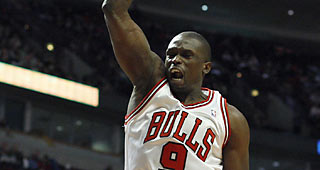Before getting into the nitty gritty of the deal, here are the exact terms as they have been reported.
Cleveland Cavaliers acquire:
- Luol Deng (expiring this year, $14.275 million full-season salary)
Chicago Bulls acquire:
- Andrew Bynum (functionally no money since he will presumably be cut right away. If not, $6 million this year and $12 million next year if they elect to keep him)
- The right to swap picks in the 2015 draft if both teams make the playoffs and Chicago finishes with the better record
- Sacramento’s pick owed to Cleveland. According to our database, the pick is top-12 protected this season and top-10 for 2015-2017. If the pick falls in the top 10 each of those seasons, it becomes a 2017 second-round pick.
- Portland’s 2015 second round pick
- Portland’s 2016 second round pick
For the Bulls
In effect, evaluating the trade for the Bulls centers on the idea of whether Luol Deng would have returned to the team once he hits free agency this summer. There are plenty of reasons to expect that he would have left, particularly considering the medical procedure last year. If the team was convinced Deng would head elsewhere after this season, they did a pretty good job moving him. Plus, they avoid potentially overpaying him, which could have been rough with so many other large commitments.
In terms of the assets they acquired, it seems fair to effectively write off the 2015 pick swap since it does not seem super likely that the situation will present itself or yield a big value if it happens. The most it could swing would be from #30 to #15 which would be valuable but it seems unlikely that the Bulls and Cavs will each be that good. Honestly, I am not convinced that Deng stays (more on that later!) and Cleveland’s spot as a playoff team is far from secure either way. Even then, we will have to see what Chicago looks like a year from now as well.
The pick from Sacramento is tantalizing but not super impressive due to the protection. The big factor here is the fact that it reverts to a 2017 second rounder rather than being unprotected if it stretches out that far so the upside is much lower. Still, the Kings are trying to get better so that could end up being a near-miss lottery pick in a season or two. Not bad.
The second rounders are extra swings at prospects and that’s fine.
It may turn out that the biggest asset the Bulls got by trading Luol Deng came from how it affects their own 2014 first round pick. With Rose and Deng out of the picture, the Bulls are clearly not looking to win this season and I would not be surprised to see both Joakim Noah and Taj Gibson miss meaningful time down the road. A Tom Thibodeau team can still make the playoffs, though it seems like the edict is pretty clear at this point. In a lottery this strong, that pick could be huge. At the same point, if that ends up being the best thing they get out of trading a player with value like Deng, they likely could have gotten more from another desperate team before the deadline.
The other meaningful benefit comes from the luxury tax. Just this weekend, I was talking with another member of the NBA media about how strange it was that so few teams were just over the luxury tax line and the Bulls managed to get themselves under via this trade. If they stay below it next season, it effectively removes them from the destructive “repeater tax” for the remainder of this CBA. If those savings eventually make their way to the team, it could be a huge benefit.
Grade for the Bulls: B+
For the Cavaliers
In an incredibly downtrodden Eastern Conference, even a tired and worn down half-season from Deng could be enough to make the playoffs. Unfortunately, the Cavs were worse than most people thought before making the trade and will still need plenty to go right in order to make the playoffs this season. Whiffing on so many draft picks made it much harder, but Deng turns one of their biggest weaknesses into a strength when he is on the court. If both he and Kyrie Irving can stay healthy, they might find a way to get above teams not necessarily interested in winning this season, a group that likely includes Chicago now.
What makes matters worse is that this could produce enough pressure to have management overpay Deng when he becomes a free agent this summer, which would actually be the worst of both worlds. While I love Deng as a player and competitor, his value to teams will erode as he gets older and he appears destined to get a bigger contract than his play will warrant for his early thirties. Plus, Cleveland had cap space to work with anyway so they are relying on Deng taking a “hometown discount” for a team he plays with for a few months that also does not lead to him getting overpaid. A risky proposition.
The bigger question is why. Like the Charlotte Bobcats and Sacramento Kings to a degree, the Cavaliers appear to be going all-in at exactly the wrong time. This draft looks to be the best in a decade and there just is not enough talent beyond Irving on this Cleveland team to make any noise in the postseason even if they make it in.
At this point, the second-biggest competitive advantage in the NBA is competent ownership. By wanting to win now, Dan Gilbert’s team lost assets to be better for a year that means very little to the long-term arc of the team. Years ago I used the term “Timetable of Contention” to describe when a team would be best as the lens with which to view potential transactions. For the Cavs, that should be a few seasons off in the distance before and after this trade.
While I do not think that the assets they gave up were particularly valuable, they certainly made more sense for this core than worsening their own draft pick, spending more money, and not getting any long-term assets when the long term should be the focus of the front office.
Grade for the Cavs: D-



